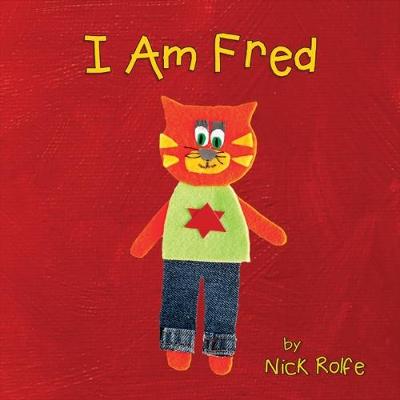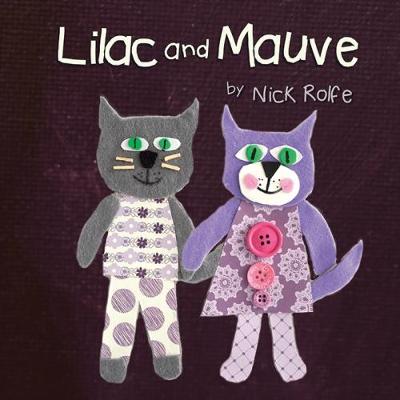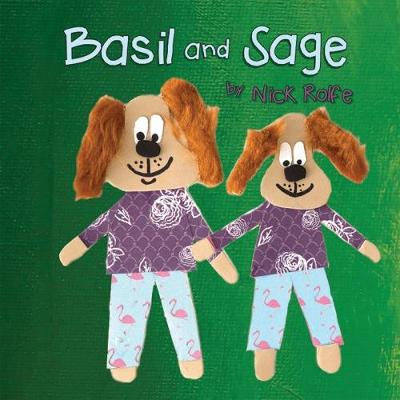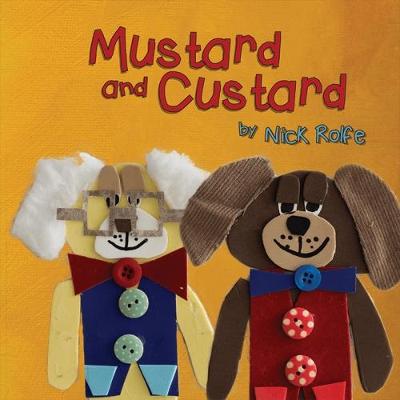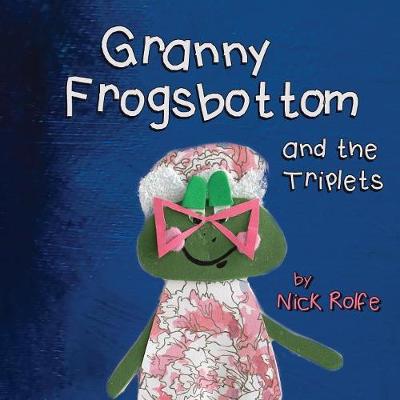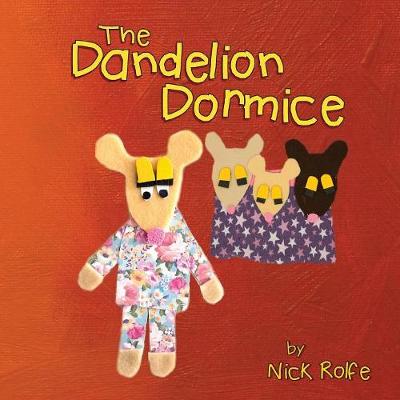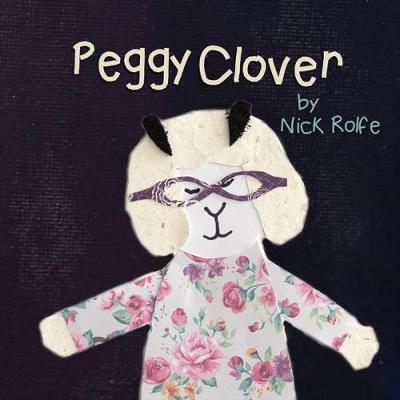Rainbow Street
7 total works
Felicity is not happy. She feels much more like a boy than a girl. But what will happen when she tells people she wants to be Fred?
Part of the Rainbow Street Series, I Am Fred is a story based on real-life discussions between a mother and her son who, inside, increasingly felt more like a girl. The book came out of stories the author told her younger 5-year-old son to try to explain his teenage brother's gradual transition into a girl.
How do you talk about sexual identity to a young child who does not yet know about sex? Is it right and appropriate to discuss sexual topics with young children? That's the point, this book is not about sex it is about self-esteem, self-awareness and self-identity: gender identity. With this understanding comes diversity and acceptance. This book easily finds a home at Your Stories Matter, alongside other diversities including dyslexia, dyspraxia, ADHD and autism.
The Rainbow Street books are all aimed at 4- to 6-year-old children, using colourful pictures of animals to tell stories of gender identity. They all share the common theme of acceptance and could equally be used at home and in school to discuss all forms of difference and diversity.
By sharing the Rainbow Street Series of books with young children, the aim is to make gender diversity no big deal and no different to accepting and respecting ethnic diversity, religious diversity and forms of neurodiversity. Stories in the series cover topics ranging from gender identity and adoption by same-sex parents, through to single fatherhood and it being ok to live alone in old age.
As with all of its books, the publisher - Your Stories Matter - aims to help people know they are not alone with what makes them different. If a young person or adult can relate to a story, it gives them hope and encourages them to share their concerns. The publisher aims to provide free teaching resources for all of its books that can be used in schools, to help improve understanding and celebrate differences.
Part of the Rainbow Street Series, I Am Fred is a story based on real-life discussions between a mother and her son who, inside, increasingly felt more like a girl. The book came out of stories the author told her younger 5-year-old son to try to explain his teenage brother's gradual transition into a girl.
How do you talk about sexual identity to a young child who does not yet know about sex? Is it right and appropriate to discuss sexual topics with young children? That's the point, this book is not about sex it is about self-esteem, self-awareness and self-identity: gender identity. With this understanding comes diversity and acceptance. This book easily finds a home at Your Stories Matter, alongside other diversities including dyslexia, dyspraxia, ADHD and autism.
The Rainbow Street books are all aimed at 4- to 6-year-old children, using colourful pictures of animals to tell stories of gender identity. They all share the common theme of acceptance and could equally be used at home and in school to discuss all forms of difference and diversity.
By sharing the Rainbow Street Series of books with young children, the aim is to make gender diversity no big deal and no different to accepting and respecting ethnic diversity, religious diversity and forms of neurodiversity. Stories in the series cover topics ranging from gender identity and adoption by same-sex parents, through to single fatherhood and it being ok to live alone in old age.
As with all of its books, the publisher - Your Stories Matter - aims to help people know they are not alone with what makes them different. If a young person or adult can relate to a story, it gives them hope and encourages them to share their concerns. The publisher aims to provide free teaching resources for all of its books that can be used in schools, to help improve understanding and celebrate differences.
Lilac and Mauve can't have babies of their own. So they decide to adopt two babies who don't have a mummy or daddy. But when they go to get the new babies, they are not what they expect!
Part of the Rainbow Street Series promoting gender awareness, Lilac and Mauve is a story of two parts. Firstly, the story introduces same-sex parents, though this is never discussed explicitly, because the main story is really about whether parents have to be the same as their children. As such the story can be used to discuss both gender roles and multicultural families using the single idea that it is not differences within a family that are important, but the love that bonds them together. This also makes the book helpful for discussing the idea of foster care and foster families, because it isn't only biological parents who can be a loving.
The Rainbow Street books are all aimed at 4- to 6-year-old children, using colourful pictures of animals to tell stories of gender identity and family diversity. They all share the common theme of acceptance and could equally be used at home and in school to discuss all forms of difference and diversity.
By sharing the Rainbow Street Series of books with young children, the aim is to make gender diversity no big deal and no different to accepting and respecting ethnic diversity, religious diversity and forms of neurodiversity. Stories in the series cover topics ranging from gender identity and adoption by same-sex parents, through to single fatherhood and it being ok to live alone in old age.
As with all of its books, the publisher - Your Stories Matter - aims to help people know they are not alone with what makes them different. If a young person or adult can relate to a story, it gives them hope and encourages them to share their concerns. The publisher aims to provide free teaching resources for all of its books that can be used in schools, to help improve understanding and celebrate differences.
Part of the Rainbow Street Series promoting gender awareness, Lilac and Mauve is a story of two parts. Firstly, the story introduces same-sex parents, though this is never discussed explicitly, because the main story is really about whether parents have to be the same as their children. As such the story can be used to discuss both gender roles and multicultural families using the single idea that it is not differences within a family that are important, but the love that bonds them together. This also makes the book helpful for discussing the idea of foster care and foster families, because it isn't only biological parents who can be a loving.
The Rainbow Street books are all aimed at 4- to 6-year-old children, using colourful pictures of animals to tell stories of gender identity and family diversity. They all share the common theme of acceptance and could equally be used at home and in school to discuss all forms of difference and diversity.
By sharing the Rainbow Street Series of books with young children, the aim is to make gender diversity no big deal and no different to accepting and respecting ethnic diversity, religious diversity and forms of neurodiversity. Stories in the series cover topics ranging from gender identity and adoption by same-sex parents, through to single fatherhood and it being ok to live alone in old age.
As with all of its books, the publisher - Your Stories Matter - aims to help people know they are not alone with what makes them different. If a young person or adult can relate to a story, it gives them hope and encourages them to share their concerns. The publisher aims to provide free teaching resources for all of its books that can be used in schools, to help improve understanding and celebrate differences.
Sage happily lives with just his dad, Basil. Then he falls out with his best friend, because Ted thinks not having a mum is silly. Why would Ted think that and can they ever be friends again?
Part of the Rainbow Street Series promoting gender awareness, Basil and Sage is a story that questions whether a man can provide the role of mother, and vice-versa. In modern single-parent families, many children will compare themselves to so-called traditional families where both mother and father are present. The idea that the father goes to work and the mother stays at home to look after the children is outdated, and this book aims to put that stereotype right through a gentle story aimed at very young children.
The Rainbow Street books are all aimed at 4- to 6-year-old children, using colourful pictures of animals to tell stories of gender identity. They all share the common theme of acceptance and could equally be used at home and in school to discuss all forms of difference and diversity.
By sharing the Rainbow Street Series of books with young children, the aim is to make gender diversity no big deal and no different to accepting and respecting ethnic diversity, religious diversity and forms of neurodiversity. Stories in the series cover topics ranging from gender identity and adoption by same-sex parents, through to single fatherhood and it being ok to live alone in old age.
As with all of its books, the publisher - Your Stories Matter - aims to help people know they are not alone with what makes them different. If a young person or adult can relate to a story, it gives them hope and encourages them to share their concerns. The publisher aims to provide free teaching resources for all of its books that can be used in schools, to help improve understanding and celebrate differences.
Part of the Rainbow Street Series promoting gender awareness, Basil and Sage is a story that questions whether a man can provide the role of mother, and vice-versa. In modern single-parent families, many children will compare themselves to so-called traditional families where both mother and father are present. The idea that the father goes to work and the mother stays at home to look after the children is outdated, and this book aims to put that stereotype right through a gentle story aimed at very young children.
The Rainbow Street books are all aimed at 4- to 6-year-old children, using colourful pictures of animals to tell stories of gender identity. They all share the common theme of acceptance and could equally be used at home and in school to discuss all forms of difference and diversity.
By sharing the Rainbow Street Series of books with young children, the aim is to make gender diversity no big deal and no different to accepting and respecting ethnic diversity, religious diversity and forms of neurodiversity. Stories in the series cover topics ranging from gender identity and adoption by same-sex parents, through to single fatherhood and it being ok to live alone in old age.
As with all of its books, the publisher - Your Stories Matter - aims to help people know they are not alone with what makes them different. If a young person or adult can relate to a story, it gives them hope and encourages them to share their concerns. The publisher aims to provide free teaching resources for all of its books that can be used in schools, to help improve understanding and celebrate differences.
Custard can't decide what to buy Mustard for his birthday. He asks his friends for ideas, but nothing seems special enough. What is he going to do?
Part of the Rainbow Street Series promoting gender awareness, Mustard and Custard is a story of same-sex relationships and friendship. Given same-sex friendships come naturally to young children, the book explores the idea that it is quite natural for same-sex friends to want to become partners when they get older.
The Rainbow Street books are all aimed at 4- to 6-year-old children, using colourful pictures of animals to tell stories of gender identity and family diversity. They all share the common theme of acceptance and could equally be used at home and in school to discuss all forms of difference and diversity.
By sharing the Rainbow Street Series of books with young children, the aim is to make gender diversity no big deal and no different to accepting and respecting ethnic diversity, religious diversity and forms of neurodiversity. Stories in the series cover topics ranging from gender identity and adoption by same-sex parents, through to single fatherhood and it being ok to live alone in old age.
As with all of its books, the publisher - Your Stories Matter - aims to help people know they are not alone with what makes them different. If a young person or adult can relate to a story, it gives them hope and encourages them to share their concerns. The publisher aims to provide free teaching resources for all of its books that can be used in schools, to help improve understanding and celebrate differences.
Part of the Rainbow Street Series promoting gender awareness, Mustard and Custard is a story of same-sex relationships and friendship. Given same-sex friendships come naturally to young children, the book explores the idea that it is quite natural for same-sex friends to want to become partners when they get older.
The Rainbow Street books are all aimed at 4- to 6-year-old children, using colourful pictures of animals to tell stories of gender identity and family diversity. They all share the common theme of acceptance and could equally be used at home and in school to discuss all forms of difference and diversity.
By sharing the Rainbow Street Series of books with young children, the aim is to make gender diversity no big deal and no different to accepting and respecting ethnic diversity, religious diversity and forms of neurodiversity. Stories in the series cover topics ranging from gender identity and adoption by same-sex parents, through to single fatherhood and it being ok to live alone in old age.
As with all of its books, the publisher - Your Stories Matter - aims to help people know they are not alone with what makes them different. If a young person or adult can relate to a story, it gives them hope and encourages them to share their concerns. The publisher aims to provide free teaching resources for all of its books that can be used in schools, to help improve understanding and celebrate differences.
The Triplets live with their Granny. But she is very old and there is a lot she can't do. She doesn't like the same food or music. She doesn't wear cool clothes. Poor Triplets . . . or are they?
Part of the Rainbow Street Series promoting gender awareness, Granny Frogsbottom is a story that questions whether a grandparent can step into the role of main carer. In modern families, many children will compare themselves to so-called traditional families where the mother and father are both present. But increasingly, grandparents are stepping into the role of parent, either permanently due to family circumstances, or on a regular but temporary basis while both parents are working. The book might also be helpful when discussing the idea of a foster carer, because it isn't only biological parents who can be a loving.
The Rainbow Street books are all aimed at 4- to 6-year-old children, using colourful pictures of animals to tell stories of gender identity. They all share the common theme of acceptance and could equally be used at home and in school to discuss all forms of difference and diversity.
By sharing the Rainbow Street Series of books with young children, the aim is to make gender diversity no big deal and no different to accepting and respecting ethnic diversity, religious diversity and forms of neurodiversity. Stories in the series cover topics ranging from gender identity and adoption by same-sex parents, through to single fatherhood and it being ok to live alone in old age.
As with all of its books, the publisher - Your Stories Matter - aims to help people know they are not alone with what makes them different. If a young person or adult can relate to a story, it gives them hope and encourages them to share their concerns. The publisher aims to provide free teaching resources for all of its books that can be used in schools, to help improve understanding and celebrate differences.
Part of the Rainbow Street Series promoting gender awareness, Granny Frogsbottom is a story that questions whether a grandparent can step into the role of main carer. In modern families, many children will compare themselves to so-called traditional families where the mother and father are both present. But increasingly, grandparents are stepping into the role of parent, either permanently due to family circumstances, or on a regular but temporary basis while both parents are working. The book might also be helpful when discussing the idea of a foster carer, because it isn't only biological parents who can be a loving.
The Rainbow Street books are all aimed at 4- to 6-year-old children, using colourful pictures of animals to tell stories of gender identity. They all share the common theme of acceptance and could equally be used at home and in school to discuss all forms of difference and diversity.
By sharing the Rainbow Street Series of books with young children, the aim is to make gender diversity no big deal and no different to accepting and respecting ethnic diversity, religious diversity and forms of neurodiversity. Stories in the series cover topics ranging from gender identity and adoption by same-sex parents, through to single fatherhood and it being ok to live alone in old age.
As with all of its books, the publisher - Your Stories Matter - aims to help people know they are not alone with what makes them different. If a young person or adult can relate to a story, it gives them hope and encourages them to share their concerns. The publisher aims to provide free teaching resources for all of its books that can be used in schools, to help improve understanding and celebrate differences.
The Dandelion Dormice family are different from everyone else on Rainbow Street. Because of who they are, they must sleep more than the others. But this year, when she wakes up, Donna wants to know what she has missed.
This story can be used to open discussion with young children during religious education and PSHE to accept that some of the other children they know might not do the same things that they do, such as celebrate Christmas, Diwali, Ramadan or Passover, due to their family's faith.
The Rainbow Street books are all aimed at 4- to 6-year-old children, using colourful pictures of animals to tell stories that share the common theme of acceptance and could equally be used at home and in school to discuss all forms of difference and diversity.
By sharing the Rainbow Street Series of books with young children, the aim is to make gender diversity no big deal and no different to accepting and respecting ethnic diversity, religious diversity and forms of neurodiversity. Stories in the series cover topics ranging from gender identity and adoption by same-sex parents, through to single fatherhood and it being ok to live alone in old age.
As with all of its books, the publisher - Your Stories Matter - aims to help people know they are not alone with what makes them different. If a young person or adult can relate to a story, it gives them hope and encourages them to share their concerns. The publisher aims to provide free teaching resources for all of its books that can be used in schools, to help improve understanding and celebrate differences.
This story can be used to open discussion with young children during religious education and PSHE to accept that some of the other children they know might not do the same things that they do, such as celebrate Christmas, Diwali, Ramadan or Passover, due to their family's faith.
The Rainbow Street books are all aimed at 4- to 6-year-old children, using colourful pictures of animals to tell stories that share the common theme of acceptance and could equally be used at home and in school to discuss all forms of difference and diversity.
By sharing the Rainbow Street Series of books with young children, the aim is to make gender diversity no big deal and no different to accepting and respecting ethnic diversity, religious diversity and forms of neurodiversity. Stories in the series cover topics ranging from gender identity and adoption by same-sex parents, through to single fatherhood and it being ok to live alone in old age.
As with all of its books, the publisher - Your Stories Matter - aims to help people know they are not alone with what makes them different. If a young person or adult can relate to a story, it gives them hope and encourages them to share their concerns. The publisher aims to provide free teaching resources for all of its books that can be used in schools, to help improve understanding and celebrate differences.
Peggy is very happy to live on her own on Rainbow Street. But everyone else thinks she must be sad and lonely. So they come up with lots of ideas to make her happy. What will Peggy think of all the fuss?
Part of the Rainbow Street Series promoting cultural and gender diversity, Peggy Clover is a story that questions the social norms of adults living together. While many people live alone out of circumstance, a growing number of people live alone out of choice as it gives them a feeling of freedom and independence. This might especially be true following divorce or the death of a partner.
The Rainbow Street books are all aimed at 4- to 6-year-old children, using colourful pictures of animals to tell stories that share the common theme of acceptance and could equally be used at home and in school to discuss all forms of difference and diversity.
By sharing the Rainbow Street Series of books with young children, the aim is to make gender diversity no big deal and no different to accepting and respecting ethnic diversity, religious diversity and forms of neurodiversity. Stories in the series cover topics ranging from gender identity and adoption by same-sex parents, through to single fatherhood and it being ok to live alone in old age.
As with all of its books, the publisher - Your Stories Matter - aims to help people know they are not alone with what makes them different. If a young person or adult can relate to a story, it gives them hope and encourages them to share their concerns. The publisher aims to provide free teaching resources for all of its books that can be used in schools, to help improve understanding and celebrate differences.
Part of the Rainbow Street Series promoting cultural and gender diversity, Peggy Clover is a story that questions the social norms of adults living together. While many people live alone out of circumstance, a growing number of people live alone out of choice as it gives them a feeling of freedom and independence. This might especially be true following divorce or the death of a partner.
The Rainbow Street books are all aimed at 4- to 6-year-old children, using colourful pictures of animals to tell stories that share the common theme of acceptance and could equally be used at home and in school to discuss all forms of difference and diversity.
By sharing the Rainbow Street Series of books with young children, the aim is to make gender diversity no big deal and no different to accepting and respecting ethnic diversity, religious diversity and forms of neurodiversity. Stories in the series cover topics ranging from gender identity and adoption by same-sex parents, through to single fatherhood and it being ok to live alone in old age.
As with all of its books, the publisher - Your Stories Matter - aims to help people know they are not alone with what makes them different. If a young person or adult can relate to a story, it gives them hope and encourages them to share their concerns. The publisher aims to provide free teaching resources for all of its books that can be used in schools, to help improve understanding and celebrate differences.
